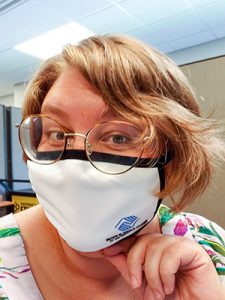Lorna Treffert Shares Success with Engineering Education Certificate

The college launched the Engineering Education Graduate Certificate Program in 2019 to provide training in education theory, research methods, and instructional design within the context of engineering education. Students from a range of engineering disciplines take the classes to expand their teaching knowledge and abilities, while others come to explore possible career paths.
Lorna Treffert graduated in 2021 with her master’s degree in industrial and systems engineering (ISE) and also became the first Engineering Vol to earn her certificate in engineering education. She is now the Evaluation and Outcomes Specialist for Boys and Girls Clubs of the Tennessee Valley (BGC). She shared her experience in the program and how it has enhanced her career opportunities.
Why did you decide to complete the certificate?
During my master’s program in industrial and systems engineering, I worked as a graduate teaching assistant for both ISE undergraduate courses and ISE’s Governor’s School. While initially I had no interest in teaching, I grew to love working with students individually and developing fun and interesting ways to present course material to my classes. While my engineering research was challenging and interesting, teaching allowed me to see the positive impact of my efforts in real time. When I saw that Engineering Fundamentals was offering an entire series of courses about STEM education, I jumped at the chance.
What did you learn through the certificate program?
From EF 501 Engineering Education Theory, I learned a great deal about how students think, the key components of motivation, and the importance of helping students develop positive STEM and education related identities. We also discussed how promote inclusion of all students and how to identify and help eliminate barriers to STEM education for underrepresented students of differing races and ethnicities, gender and sexual identities, socioeconomic statuses, and disabilities.
From EF 504 Research Methods: Quantitative, Qualitative, and Mixed I gained a much better understanding of the purpose, benefit, and rigor of qualitative research. Additionally, I was very impressed by how qualitative and quantitative research can work together to inform, explain, and expand upon each other. In the process of developing a research proposal during the course, I also learned how to write effective research questions, use theory and prior research to choose the best methods and instruments to answer my RQs, and ensure the reliability, validity, and ethical implementation of a study.
Finally, in EF 503 Engineering Instruction and Practice, I gained new perspective on what it would look like to pursue a career in academia and the full range of responsibilities which instructors are required to take on. In this course and EF 507 Curriculum Development, I collected a great deal of theory informed tools and methods for helping students develop the knowledge and skillsets required to be an effective and confident STEM professional.
What impact has the certificate program had on your professional development?
Learning about STEM education in research and practice has affirmed my desire to pursue a career in this field. In particular, covering topics such as diversity in STEM fields and the challenges that underrepresented students face has focused my career goals to working with first-year students as well as promoting and pursuing K-12 outreach. I am strongly considering pursuing a PhD in STEM education so that I will be able to teach at the university level.
How did the certificate program enhance your time at UT?
I really enjoyed all four of the courses I took during the certificate program. The class sizes were generally quite small so we were able to have really interesting and in-depth discussions about the course material. Additionally, we had numerous opportunities to implement the theory and methods as we learned them. On the research end, this included critiquing the use of theory, instrumentation, methodology, and analysis of STEM education studies as well as developing our own research proposals with semester-long feedback from the instructors and students. On the instruction side, I really appreciated being able to develop and teach lessons using the tools and methodologies we learned in class.
How have you used what you learned in the certificate program in your current position?
After completing my ISE master’s degree and the certificate program in May 2021, I have taken on the position of evaluation and outcomes specialist for Boys and Girls Clubs of the Tennessee Valley. I’m currently working to develop an evaluation strategy to assess the impact of BGC programming on our member’s academic success across clubs in Knox, Blount, Loudon, and Anderson Counties.
Coming from an Industrial and Systems Engineering background, I felt very comfortable with the statistical analysis component of the job. The real challenge, however, lies in defining the scope of our strategy, purpose, and research questions as well as determining the best methods of data collection and instrumentation which will allow us to inform programming in a timely manner, without overburdening our members and Club staff.
I feel that completing the certificate program has prepared me with the knowledge and skills to tackle this challenge as I have been able to review our course material on assessment, seek out further literature in this realm, and critically examine what other out-of-school-time programs have done. Additionally, I feel well equipped to implement both quantitative and qualitative research methods. I feel this is essential to getting a holistic understanding of where are members are at academically and therefore get them the help they need to succeed in school as well as increase their desire to learn and their school-related self-efficacy.
In what other ways, do you see the certificate impacting your future career?
I feel very confident in reaching out to Courtney Faber and all of the instructors involved in the certificate program for advice in my current work in out of school time assessment and my ambitions to pursue a doctorate in STEM education and a professorial position. I respect their knowledge and passion for education immensely and I am very grateful for their support and mentorship.